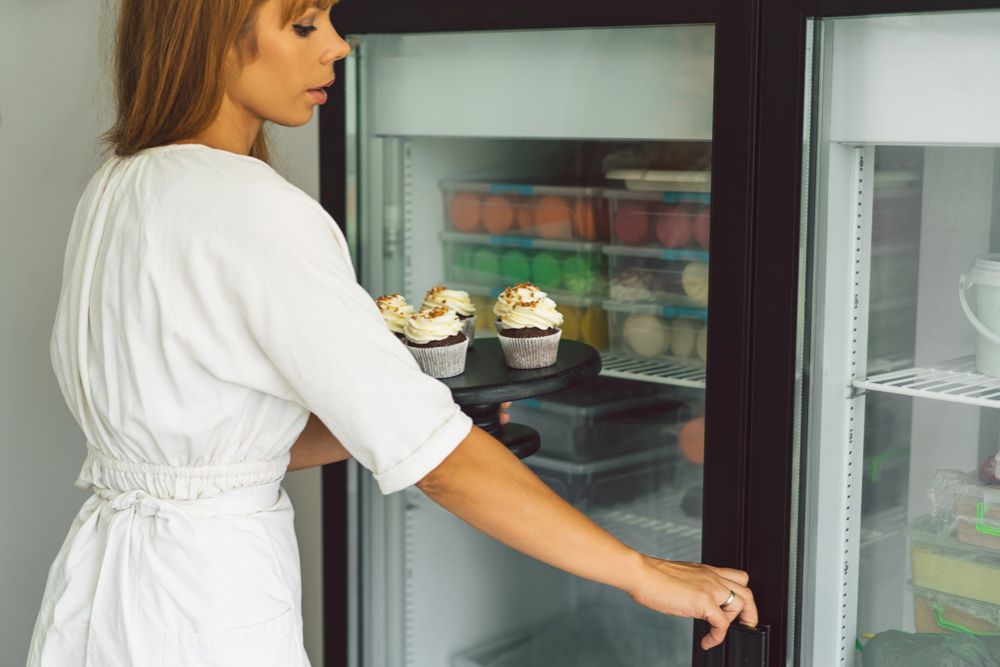A well-organised refrigerator is essential in a busy commercial kitchen. Proper stocking not only keeps ingredients fresh but also boosts kitchen efficiency. It prevents food spoilage, reduces waste, and makes locating items easier. Here are the top tips to ensure your commercial refrigeration equipment in Sydney is stocked correctly.
Use the First-In, First-Out (FIFO) Method
The FIFO method helps minimise food waste. Place older items at the front and new stock at the back. This way, staff use older items first, reducing the chance of items expiring—label the offerings with their arrival dates. Clear labelling ensures everyone knows which products to use first.
Get your drinks stored & chilled efficiently! Please browse our range of Upright Fridges in Sydney.
Label and Date Everything
Labelling is crucial in a commercial kitchen. Every item should have a clear label. Write the item name, date of storage, and expiration date. Using a color-coding system can also help identify perishable items quickly. For example, red tags are used for urgent use, and green tags are used for new stock. This makes it easier for all staff to keep track of products.
Organise by Food Group
Organising by delicacy groups enhances efficiency. Store similar items together, like dairy with dairy and vegetables with vegetables. This keeps the appliance tidy and speeds up prep time. It also reduces the risk of cross-contamination. By grouping similar items, staff can locate what they need without searching.
Store Raw Foods on Lower Shelves
Raw cuisines can drip and cause contamination. Place raw meats, sea cuisines, and poultry on the lowest shelves. This way, juices won't contaminate other offerings if they leak. It's a simple step that boosts cuisine safety. Always place raw and prepared foods in separate areas to prevent cross-contamination.
Avoid Overcrowding the Shelves
Overloading the fridge blocks airflow. Proper air circulation is critical to maintaining the right temperature. When shelves are crowded, cold air can't reach all areas. This leads to uneven temperatures and can spoil food. Keep items spaced out, and never stack items too high. This confirms consistent cooling throughout your commercial refrigerator in Sydney.
Use Clear Containers and Bins
Clear containers make items easy to see, and transparent storage bins allow staff to locate items without opening multiple containers. This reduces the time the refrigerator door is open, keeping temperatures stable. It also reduces excessive waste, as items are less likely to be overlooked.
Check Temperature Regularly
Temperature control is essential. A commercial fridge should stay between 1-4°C (34-40°F). Regular temperature checks prevent offerings from spoiling. If your product doesn't have one, invest in a reliable thermometer. Train staff to check and log the temperature daily.
Rotate Stock Daily
Stock rotation is vital to freshness. Make it a habit to rotate things each day. This helps ensure that all food is used before it expires. During rotation, inspect for any damaged or spoiled cuisines. This process keeps the equipment stocked with fresh ingredients and minimises waste.
Keep Produce Away from Fans
Fans circulate cold air, but they can dry out produce. Keep fruits and vegetables away from direct airflow. This prevents them from drying out and losing freshness. Store delicate produce in designated bins or on specific shelves. Keeping produce fresh extends shelf life and reduces waste.
Store-Prepared and Ready-to-Eat Foods at the Top
Prepared foods should always go on the top shelves of your commercial fridges in Sydney. These are typically the highest-risk things for contamination. They stay away from raw foods below by placing them at the top. This organisation improves food safety and simplifies meal prep. Staff can easily access ready-to-eat things when needed.
Utilise Door Space for Non-Perishables
The door is the hottest component of the refrigerator. It's best for options that aren't highly perishable. Use the door racks for spices, sauces, and non-perishables. Avoid storing dairy or highly perishable offerings there. This makes the most of the space without risking spoilage.
Don't Leave Food on the Floor
Food stored on the floor is at risk of contamination and a hazard in a busy kitchen. Always use designated shelves, racks, or platforms for storage. Keep floors clear to maintain hygiene and organisation. This keeps food safer and meets health and safety regulations.
Regularly Clean the Fridge
Cleanliness in the fridge is essential. Schedule regular cleaning days to clear out spills, expired cuisines, and debris. Wipe down shelves, bins, and containers. This keeps the fridge smelling fresh and prevents contamination. A clean fridge is a vital part of maintaining food quality.
Use Shelf Liners to Prevent Spills
Shelf liners can help catch spills before they spread. Place liners on shelves to make clean-up easier and keep shelves looking tidy. This small addition can save time and keep things more organised.
Underbench appliances save a lot of space and effort. Want further insights? Click here for our Underbench Fridges and freezers.
Keep a Stock List on the Door
A stock list helps track inventory. Post a list on the fridge door with the current stock and expiration dates. This gives staff an at-a-glance view of what's available, reduces over-ordering, and helps manage inventory effectively. For further insights, visit LCE – the leading supplier of commercial freezers in Sydney.
Store Delicate Items Away from Heavier Items
Delicate offerings, like leafy greens or soft fruits, can get squashed. Store these things away from heavy products. Placing them in bins or separate shelves keeps them intact, preserving their quality and reducing unnecessary waste.
Regularly Check Seals and Gaskets
Fridge door seals can wear out over time. Inspect seals and gaskets regularly for cracks or damage. Faulty seals allow warm air to enter, causing temperature fluctuations. Replace damaged seals to ensure the fridge maintains a stable temperature.
Designate Storage Zones for Different Items
Create designated zones for each type of product. For example, set aside a section for dairy, another for meat, and another for produce. This clear zoning makes it easier for staff to find items quickly, minimises cross-contamination, and keeps the fridge organised.
Separate Strong-Smelling Foods
Strong-smelling foods can affect other delicacies. Place things like fish or onions in airtight containers to prevent odours from spreading and affecting other foods. Airtight containers are also helpful for preserving freshness. You can get further information by visiting LCE – one of the top commercial refrigeration suppliers, distributors & dealers in Sydney.
Set Up a Fridge Maintenance Schedule
Regular maintenance keeps the fridge in top condition. Set a schedule for defrosting, deep cleaning, and checking parts. This extends the fridge's lifespan and ensures it works efficiently. A well-maintained fridge keeps food safe and reduces energy costs.
Educate Staff on Proper Storage Practices
Proper stocking is a team effort. Train all staff on best practices for organising and storing cuisines. When everyone follows the same system, the fridge stays organised. Staff training reduces mistakes and helps maintain quality.
Store Opened Cans in Separate Containers
Opened cans can cause metallic contamination. Transfer contents into food-safe containers before storing them in the fridge. Track for freshness by marking the boxes with the date of transfer.
Organise by Expiration Date
Within each category, arrange items by expiration date. Place soon-to-expire items at the front of each section. This helps ensure items are used before they spoil, reducing waste.
Use Digital Inventory Tracking
Digital systems can track commercial fridge inventory in real-time. Use an app or software to log items, dates, and quantities. This keeps inventory accurate and reduces the risk of overordering or spoilage.
Our web page offers a huge variety of Commercial Display Freezers. Click to check them out!
Schedule a Weekly Fridge Check
Set a specific day each week to inspect the fridge. Check for expired items, clean up spills, and reorganise if needed. A weekly check keeps the refrigerator in top shape and improves food quality.
Conclusion
By following these stocking tips, your commercial refrigerator can run more efficiently. A well-organised fridge keeps food fresh, reduces waste, and ensures a smoother kitchen workflow. Proper stocking practices support food safety and contribute to your kitchen's success.






